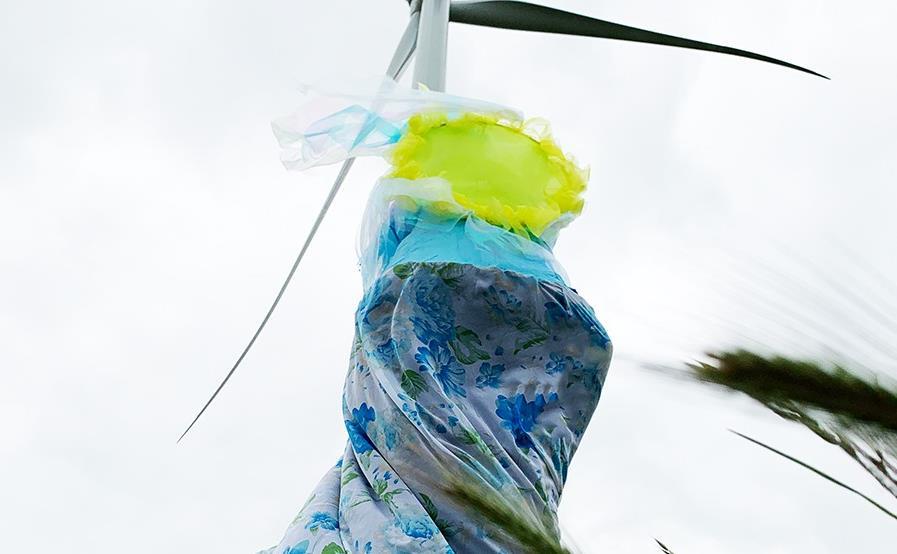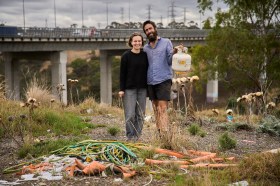We keep hearing words like pivot, resilience and reimagined, but practicing artist and lecturer Dr Jill Orr says the reality looks a little different than the vocabulary.
‘I think that imagination and possibility – and daring to take a risk – are the seeds for the transferrable skills needed everywhere,’ Orr told ArtsHub.
Orr is Senior Lecturer in Visual Arts at Federation University Arts Academy, which has campuses across regional Victoria, in Ballarat and Gippsland.
She said that while nothing can truly replace the buzz and energy of a full studio of students, where everyone can speak freely rather than waiting for a zoom-click in or delayed unmute, she recognised that the online world will not go away, and in that, there are great opportunities for artists.
‘The skills artists need – whether they work locally, nationally or internationally – depend a huge amount on being computer literate, and creating work that can translate digitally,’ said Orr.
‘So we try and focus on helping students become articulate in their practice in this environment; to know what is going on around them artistically, environmentally, socially and culturally, and at the same time to have an ability to see the different possibilities of presentation and connection,’ Orr continued.
She described this pandemic year as one that has forced us to use our ‘imagination muscle’.
Orr described: ‘The practice of art is all about that, whatever medium you deal with. So if an idea comes up – don’t dismiss it as too crazy – let it be and work it through!’
WHAT’S ALL THE TALK ABOUT TRANSFERABLE SKILLS?
While many might just draw a line through 2020, those at the start of their professional lives, can’t.
Orr has viewed this as a unique moment to really build upon their arsenal of skills as artists, and to seize this moment to rethink the dissemination of their work and how they connect with audiences.
‘I have thought a lot about transferable skills, and it is really hard to pin down what we are precisely talking about, especially when we are visualising industries that haven’t happened yet,’ said Orr.
‘You might be an artist employed in the renewable energy sector, for example, but what that looks like, what you do, is not known yet. [Simply], they are abstracts, and artists are well equipped for dealing with abstracts.’
She continued: ‘What we do know, is that artists have great capacity to communicate ideas to others, and are used to working in an environment where everyone comes from a different skills base; those are incredible skills.’
‘Driving a computer is one thing, but you also have to fill it [with content] – to write, to create images, to listen and read and respond,’ Orr added.
COLLABORATION IS KEY FOR NEW WORLD THINKING
Orr said that collaboration within the Arts Academy has always existed, but being online has allowed it to venture further afield.
‘You can rattle off different words and skills as transferable, but the guts of it is just trusting your ideas and spitting them out, and then building upon them together – and there is where the collaboration lies,’ said Orr.
She has been teaching a course across performing arts, visual arts and communication students – all in together – and which she ‘team taught’ with other cross-discipline staff, resulting in a more textured, dynamic and fluid learning experience.
‘Our students could immediately see how they could translate those skills online, and how that might play out in a post pandemic working environment. It is that kind of quality we are engendering artists – to say trust your instincts – and create something.’
She said emphatically that the work produced during 2020 looks different. ‘That is because it has largely been screen-based, so a dancer has had to really work out how to express their dance filmically, or a sculptor has been forced to ask, “how do I make an object live on a screen?”
She made the point that for those big international exhibitions and biennales, artists have long just sent a USB-stick for a video installation or suite of images to be presented.
‘Some of the best video artists use those visualisation skills, of knowing how an artwork will be viewed, and conceptualising and communicating that to others,’ said Orr.
‘In essence, those skills and that kind of participation has just been amplified with COVID.’
Orr said that while the transitions we have all navigated have been ‘unbelievably stressful, it taught people to learn serious technologies and to find solutions to make technology work for you!’
She spoke of one student living on a farm in a remote location with a bad internet connection. ‘She would drive to the base of a telephone tower and set up her laptop on the dashboard and did our class from there; people had to be a bit inventive, and as a result, we are more nimble and innovative in creative problem solving,’ said Orr.
‘Adaptable skills for the arts – keeping the imagination alive through new possibilities – is what is going to define our future,’ she concluded, adding that she feels confident her students at Arts Academy, and the creative industries, are in good hands to take on the challenges still to come post-pandemic.
To learn more about Federation University Arts Academy courses.





